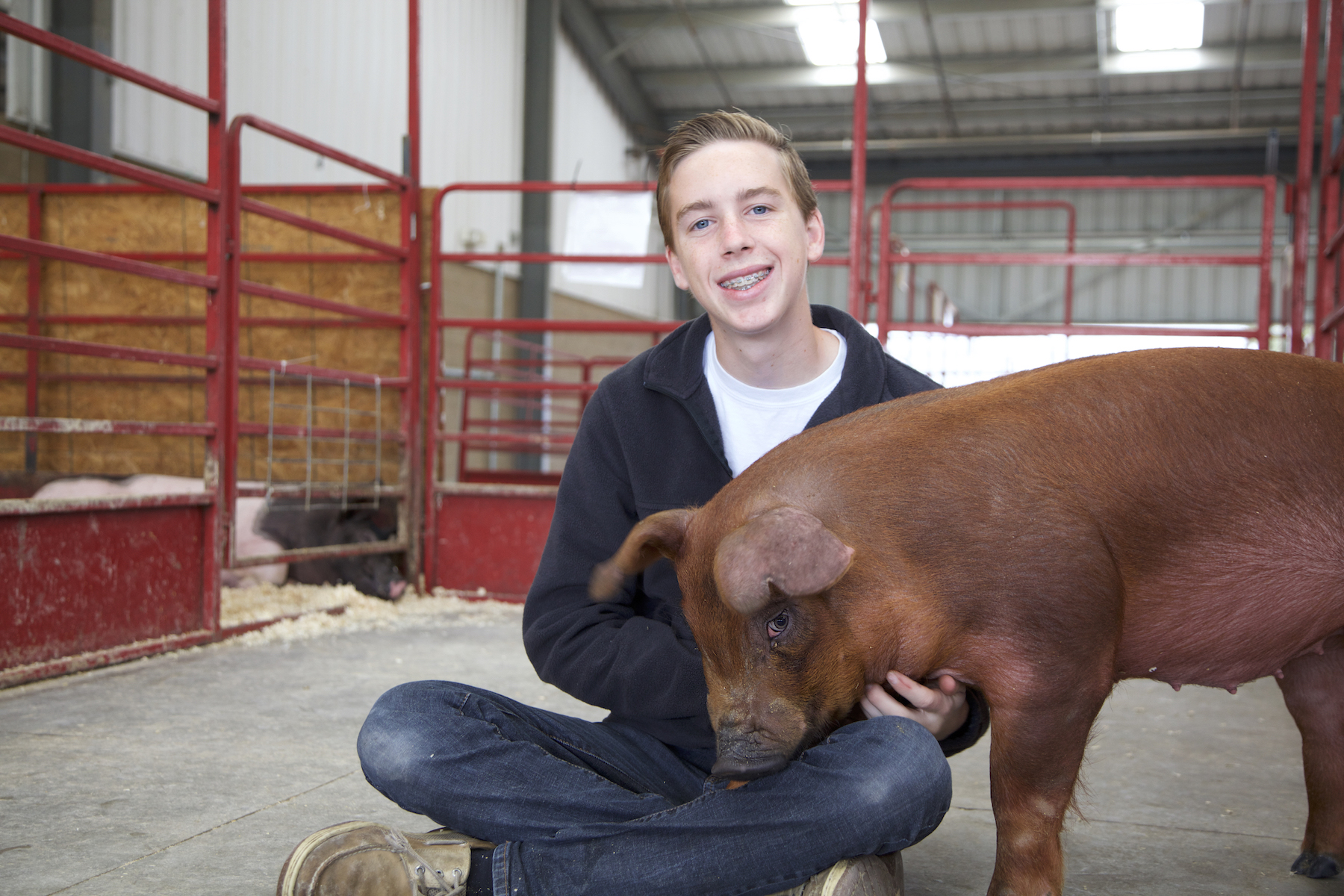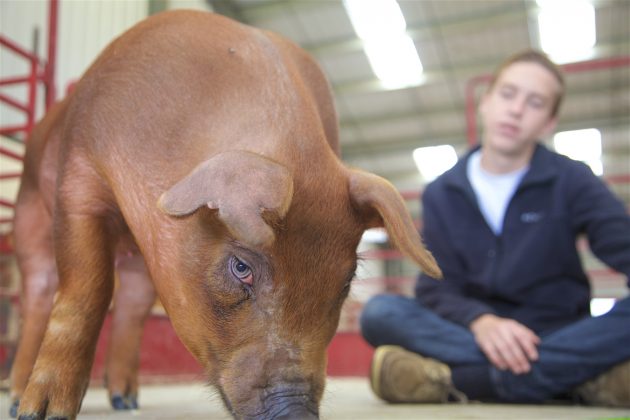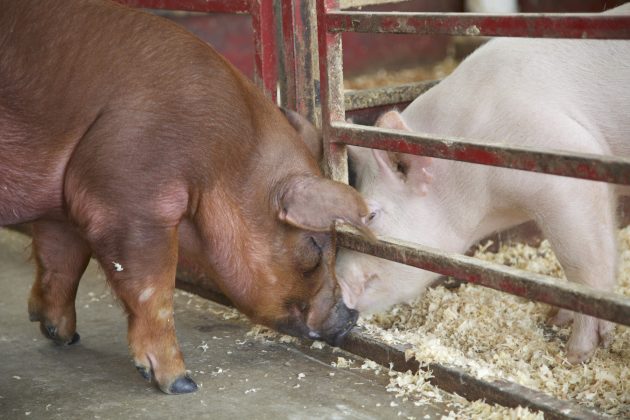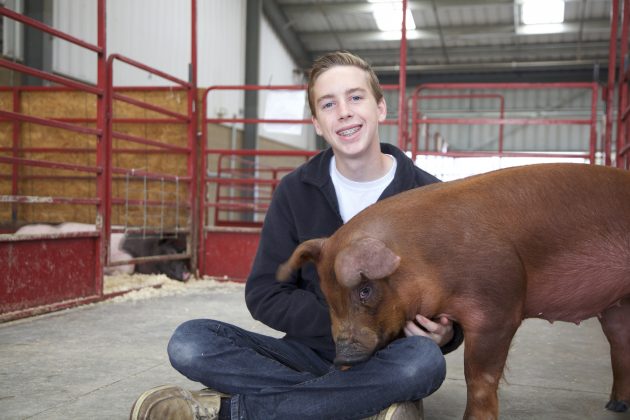Kiwi the pig is worth more than the average car.
As this year’s Heritage Hog, she could fetch over $80,000 at the San Benito County Fair in September. At least that’s the hope of her 17-year-old caretaker, Noah Janzing.
The nonprofit San Benito County Heritage Foundation chose Janzing to raise the hog as part of an annual fundraiser. Pigs of the past have been sold for tens of thousands of dollars, all of which went to upgrades and renovations at the Bolado Park Fairgrounds.
For now, Kiwi lives in the Rajkovich Agricultural Builiding at San Benito High School. Bleats and squeals resonate through the airy barn as animals await breakfast, served by students in the Future Farmers of America program.
Janzing arrives every morning to feed Kiwi and other animals on schedule. The teenager is also taking care of a steer, several chickens and another hog, Ted, who shares a pen with Kiwi. They’re all headed to the county fair this fall.
The senior has been a member of FFA since his sophomore year, when he raised one pig and 15 turkeys for program. And no—corralling the big birds was not an easy task.
No one else in his family is involved with raising animals, but Janzing felt right at home in the program, named one of the best in the state this year. He credits advisor Myndi Krafft, and last year’s heritage caretaker Shannon Maguire, with encouraging him to apply for the Heritage Foundation program.
After a few years of raising animals, Janzing has determined that hogs are definitely his favorite kind of animal to raise.
“They can be the sweetest and nicest pigs, and they can be the craziest,” he said. “Kiwi is definitely one of the calmest pigs I’ve ever raised.”
Janzing is a Bolado Park Event Center youth ambassador and was selected for the Heritage Foundation fundraiser out of a pool of high school applicants.
He’s also now part of the FFA leadership and loves seeing students who are new to the program learning to show animals at the fair in two different classes—market and showmanship.
“It’s a fun experience, a little nerve-wracking going into the showroom,” Janzing admitted. “But I think it makes a lot of us who we are.”
He’d like to go into animal sciences or the agricultural field, possibly concentrating in genetics. His top choice for college next year is Colorado State University.
His charge, Kiwi, is a copper-toned, blue-eyed porker, weighing in at 155 pounds. Her distinctive brownish fur is a signature of the Duroc breed and makes her stand out in a barn full of black-and-pink pigs. It’s also the source of her memorable moniker, as she looks a bit like a kiwi fruit.
Janzing takes the hog out for regular walks. Outside of her pen, she noses at everything in a search for leftover feed, and nibbles at Janzing’s shoes when she finds none. Her food—along with shavings and medicine—is donated by McAbee Feed in Hollister. The goal is to get Kiwi up to 270 pounds before the fair.
Like many hogs at the auction, Kiwi is destined for the frying pan or the grill. Janzing said that it can feel a little strange to raise an animal that’s headed for the market—the pair has a routine of feeding and trots around the barn that will be over once Kiwi is gone.
Still, Janzing said he understands that it’s a part of farm life.
“It’s pretty hard to not get attached to animals like these,” he said. “But my goal is to give Kiwi the best of her life while she’s here.”
The Heritage Hog stewards are responsible for more than just taking care of the animals. As part of the program, they send out letters and information to potential buyers and make themselves available to talk about the hogs.
The Heritage Foundation has been a fair partner for the last seven years, according to President Richard McAbee. Their mission is to preserve the agricultural heritage of San Benito County. The idea for the hog came from other fairs around the country.
Last year’s hog went to Powerhouse Farms in Los Banos with a final price of $77,000. The money is raised through buyers’ certificates that are bought in $1,000 increments.
After state cuts to county fair budgets, the money has been essential to upgrading the pavilion, youth hall and a parking area, said Donnette Silva Carter, president of the 33rd District Agricultural Association.
She said high schoolers raising the hogs have been nervous about raising more money than the year prior—but that they shouldn’t fret.
“They do a great job of raising the animals,” she said.
The money compiled this year—along with a grant from the state—might go to building a 1,000-gallon water storage tank, Carter said. The tank would provide water supplies to the park should the water line go down.
The best part about these fundraisers, Carter said, is that the people who come out to support Bolado Park are members of the community. Although the fair is small, the livestock auction last year raised over $1 million to benefit the park.
“These folks are exercising their opportunity for community stewardship,” Carter said. “They want to see the park sustained.”












